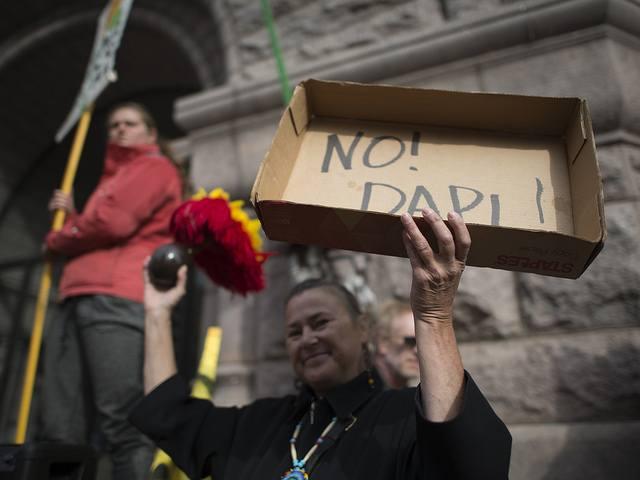
Less than 24 hours before protesters were due to launch a world-wide "day of action" against the construction of the Dakota Access Pipeline, the Obama Administration announced its decision: Approval of the last leg of the pipeline would be put on hold until local communities had been adequately consulted.The Standing Rock Sioux Tribe have been protesting the construction of the pipeline for more than a year, which it says would put the tribe's drinking and irrigation water at risk in an area that is already impacted by drought.
The decision by the US Army Corps of Engineers (USACE) follows more than a month of deliberations by the agency and weeks of escalating tensions between the water protectors -- as the opponents call themselves -- and heavily armed police on the banks of the Missouri River and the adjacent Lake Oahe. Reports of injured and maced protesters (and one report of a journalist shot in the back by police) have gone viral on social media, prompting the United Nations to condemn the "militarized response" by police and outcry from environmental and human rights groups.
It's also inflamed anger against the construction company, Energy Transfer Partners, which has refused to halt construction in those areas not under review by the USACE. On election day, as voters were heading to the polls, the company announced that it was "mobilizing horizontal drilling equipment" to complete the final leg of the construction. It has acknowledged that it would halt work for a "reasonable time period," but only if it could be assured that it could finish the pipeline. According to the company, the pipeline is complete accept for a section at the intersection of the Missouri River and Lake Oahe.The construction company has not said what it would do if the USACE were to turn down the company's request to drill under the lake as planned.
With the recent election of Donald Trump as the country's next president, the water protectors are pinning their hopes on Obama to come up with a compromise, if not an outright decision that would block the pipeline's controversial route. A denial of access to Lake Oahe would force the company to tear up and reroute portions of pipeline that had previously been approved by the USACE -- an action that would likely forestall its construction well into next year, when Donald Trump is due to take office.
And for the Standing Rock Sioux, that could be a problem. Trump has already signaled his support of the project, both in word and in financial investment. According to the Guardian Newspaper, Trump's financial disclosures indicate that he has as much as $1million invested in Energy Transfer Partners. He has additional investments in Phillips 66, which owns 25 percent of the pipeline. The investments didn't hurt the Trump's campaign, or the Republican party, either, both of which benefited from campaign donations from Energy Transfer of more than $100,000. The decision by the USACE not to grant completion of the pipeline may be viewed by many as the humane and environmentally sound thing to do, but it doesn't mean that Trump, with his financial support of the pipeline, won't try to reverse the Obama Administration's fix.
Still, the USACE's announcement that it planned to solicit input from community groups (the Standing Rock Sioux in particular) was anything but a useless gesture. The USACE's decision to delay a final answer helped thin the lines of protests planned for yesterday's "day of action." More than 200 protests were scheduled to take place across the globe yesterday, galvanized by indigenous groups that see the Standing Rock Sioux's plight a symbol of a growing infringement of Native rights across the globe. University students in Canada and the U.S. have also expressed their support for the movement at their banks. TD Bank customers closed down their accounts as part of a growing displeasure with companies that invest in the controversial pipeline.
Meanwhile in North Dakota, water protectors are digging in for what will likely become a difficult winter. Although the tents and makeshift homes have thinned considerably since the summer, the support for the water protectors' message hasn't. The fate of the Standing Rock Sioux's effort to protect its primary water source has become this decade's defining battle about the rights of a community to exist in the face of commerce and profit.
Image: Flickr/Fibonacci Blue
Jan Lee is a former news editor and award-winning editorial writer whose non-fiction and fiction have been published in the U.S., Canada, Mexico, the U.K. and Australia. Her articles and posts can be found on TriplePundit, JustMeans, and her blog, The Multicultural Jew, as well as other publications. She currently splits her residence between the city of Vancouver, British Columbia and the rural farmlands of Idaho.














